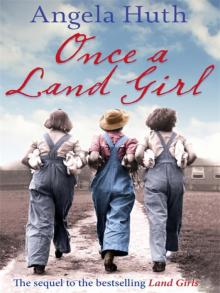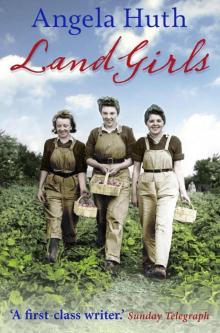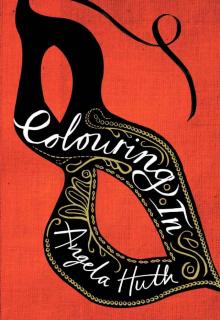- Home
- Angela Huth
South of the Lights Page 9
South of the Lights Read online
Page 9
‘What the hell are you doing here?’
She leant up against the door, head back, one knee bent, the pose she so often used against the chicken shed when she knew Evans was approaching. ‘It wasn’t your night for coming round. Spying on me?’
Evans picked up the empty fish paste jar, rolled it in his hands, feeling the ridged glass. Confused by sleep, head full of searing pains, he had to be careful. He had to take things slowly: not do or say anything reckless, or she’d go. She was in a mood, Brenda was, he could see. If he was too hard on her, she’d go for ever.
‘It’s half-past four,’ he said, looking at the clock.
‘So?’
‘That’s late to be out with another bloke when you’re engaged to be married to me.’
Brenda slouched towards the sofa, her bed, and slumped down upon it. She crossed her legs, pulled the shawl round her breasts, leaned against the wall. An uncomfortable, uncaring position.
‘I haven’t done nothing wrong,’ she said.
‘I don’t know what you’ve done, do I?’
‘I’m telling you.’
‘Who was he? Why didn’t you tell me?’
‘He gave me a lift last week.’
‘I’ve told you, Bren, you shouldn’t go getting hitches any more, not looking like you do. You’re asking for trouble.’ In his effort to be calm, reasonable, Evans spoke very slowly.
‘He was nice enough, works up at the Air Base. Said there was going to be this party, would I like to go? You know how you don’t like parties. I didn’t think there would be any harm.’
‘Is this the first time you’ve done anything like this?’
‘Like what? I haven’t done nothing wrong.’
‘Gone out with someone else, not telling me. I wouldn’t have minded if you’d told me.’
‘You would. Bet you would. You’d have got yourself so screwed up I wouldn’t have been able to go.’
Evans sighed.
‘Where’d you get that shawl?’
‘Bought it.’
‘What, for the party? Specially for the party?’
Brenda shrugged. She ran a finger round the outline of her lips, to test if they hurt, a thing she often did after Evans had kissed her fiercely.
‘I needed a shawl.’
Evans felt his heart quicken. He rolled the jar faster in his hands. Brenda, defiant, was beautiful on the bed. Out to provoke him.
‘We’re engaged to be married, you know,’ he said.
He had intended to say something quite different. Something witty and light, to make her laugh and ask forgiveness. Then, in spite of the cruel headache, he would kiss her and take her, make her cry out she was sorry –
‘So why did you come round? Spying?’
‘I came round to give you some news.’
‘Oh, yes.’
‘Honestly.’
‘Postage going up again, is it?’
‘Bitch.’
Brenda laughed.
‘You look quite furious, sitting there. Quite the furious fiancé. Here, come and sit down.’ For a moment, patting the bed with a hand that slipped from out of the shawl, she was almost coquettish. Without giving himself time to think whether he did the right thing, Evans went to her. He too leant his head uncomfortably against the wall, stuffed his hands in his trouser pockets. They made ugly lumps, material growths, upon his solid thighs. Through the window he could see a strand of lemony light on the prison walls.
‘I’m not yours, you know,’ said Brenda. ‘I’m not yours to possess, absolutely. Not now, or when we’re married, or ever.’
‘But we’re engaged.’ Frustrated to hear himself repeating this feeble protestation, Evans tried to scour the thumping mess of his head to find a more lucid reason for his distress. ‘And when people are engaged, there are usually rules. Duties to each other.’
‘So there may be,’ said Brenda. ‘But people make their own rules. So if yours are different from mine, well then, you have to live by yours and I have to live by mine.’
‘That attitude takes no account of love.’
‘Ah, love.’ She pouted. ‘If you really loved me you wouldn’t be making this silly scene. You’d be letting me get to bed.’
With sudden relief, Evans took this as a hint. He leant towards her, fumbling at the shawl, aiming his mouth at hers. Brenda pulled back, grimacing.
‘You smell horrible! You smell of gin. Take your hand off, Evans. You’re hurting.’
Evans tightened his grip on her shoulder. The sudden energy of anger flowed through him, giving strength to his drained body, numbing the pain in his head. Incredulous, he kneaded her flesh. Brenda was rejecting him. Back from the Air Base with another man, she was rejecting him, her rightful fiancé.
‘What did he do to you?’
‘Leave . . . me . . . alone.’ Brenda struggled. ‘He didn’t do anything.’
‘Is that the truth?’
‘That’s the truth – you wouldn’t know the truth.’ She closed her eyes. Her mouth squirmed open in pain. Evans felt a smile spread across the stiff skin of his own mouth.
‘I’d kill him if he touched you.’
‘Bragger!’ In spite of her discomfort Brenda managed to spit out the word. ‘You wouldn’t hurt a mouse.’
‘That’s what you think. Did he touch you?’
‘No! You’re hurting me, Evans! Let go.’ She kicked uselessly at his shin. In her struggle to get away from him she slid to a lying position on the bed. Evans glared down at her, his breath fast.
‘Did he touch you? Did he touch you?’
‘No! Stop shouting. You’ll wake – all right, in the car! In the car, if you must know, he put his hand on the back of my neck and I told him, I told him, Evans, not to go on!’
She was crying now. Evans gave her just one slap on the face. It stung his hand.
He stood up, examined his own palm and huge fingers in the light that was now pale and clear. Then he looked at Brenda, head in her shawl, whimpering. The sound bubbled in strange harmony with the hiss of the gas fire. One of her shoes had fallen off. Her bare foot, moving slightly, was blackish between the toes.
‘I’ll not be seeing you for a week or so, then,’ Evans said. ‘I’ll have to be thinking things over.’
Outside, he was struck by the chill of dawn. He had arrived, so long ago, without a coat. Now, in the car, he shivered.
Evans drove home but could not tolerate the idea of spending the two hours till breakfast in his room. Instead, he decided, he would go to the room awaiting him in Wroughton House. He had the key to the back door. He would not wake Mrs Browne.
He walked slowly up the front drive, no longer aware of the cold. Ground mists were rising from the lawns and distant fields. They frothed, too, about the base of the house, confusing the more solid lines of lavender. Evans felt stiffness in his legs. He moved from the drive, whose scrunch broke the silence, to the grass. He took long strides across to the natural pond, dew soaking his shoes. The air was soft with promise of a fine day, but no mere panacea of early morning could quell the feelings insurgent within him. When madness settles upon men’s minds, the madness of lust or rage or jealousy, the path to reason is quite lost: the desire to find it, even, obliterated. Thus it was that Evans strode almost blindly about the gardens, the bright trees, the white of hawthorn flower and brown glint of water hurting, rather than healing, his eyes. One thing only was clear to him: Brenda, always so elusive, was now quite lost to him. Knowing little of her Birmingham childhood, Evans judged her to be a girl unused to violence: they had had rows before, but never like this. She would have every right to leave him, now. His reckless behaviour had not ‘accounted for love’. The irony of his own words, chiding words of just an hour or so ago, tightened the band of terrible pressure about his head.
He passed the kitchen window for the third time. A figure waved at him from within. The church clock struck six. He went inside.
Mrs Browne had made the kitchen warm. Coffe
e puckered on the stove. Evans sat down at the white table, chosen in the days when efficient cooking was required to fill the needs of constant guests. Mrs Browne, small as Lark, it occurred to Evans, was in a dressing-gown – pretty quilted cotton stuff, nothing like Lark’s, that: he might have had the energy to admire it on a more ordinary occasion. There were shadows under her eyes: deep as evening shadows upon tired faces, strange so early in the morning. Taking a seat opposite Evans she poured two cups of coffee, pushed a bowl of sugar and jug of milk towards him.
‘I was up early. I saw you wandering about,’ she said.
‘I’ve had a night.’
‘Aren’t you cold?’
‘Warmer now, thanks.’
They sat in silence for a while, two people so deeply submerged in that state of preoccupation with their own thoughts that neither could summon the energy to enquire about the other. Eventually Evans said:
‘I went to tell her the news about the room. I thought she’d be pleased, and I hit her.’
‘She’d been out with someone else?’ Evans nodded. One of several good things about Mrs Browne was that she understood things before there was need to explain.
‘So I didn’t tell her in the end. About the room, I mean. No use now, really. I mean, I suppose it’s all over between us.’
Curiously, considering the seriousness of the situation, Mrs Browne smiled.
‘Of course it’s not! I should go and tell her tonight, if I were you. Bring her here.’
‘I told her I wasn’t going to see her again for a week or so. I told her I had to think things over.’
‘Oh, I shouldn’t do that.’ Mrs Browne was almost gay. ‘There’s no point in thinking things over if you know what you ultimately want. Besides, leaving her for a week will give her time to think up all sorts of things against you. Stupid.’
‘But I hit her.’
‘Women can survive a few bashes.’
‘Never imagined I could do such a thing, not in all my life.’
‘I expect she provoked you.’
‘She did. She provoked me all right.’ He paused. ‘The thing about Brenda, it’s always been the same, I never know where I am with her. She’s my fiancée. She’s mine, isn’t she? Yet I can’t seem to . . . get a real hold of her. I can’t seem to be sure of her, ever. I’m always scared she’s just out of my reach.’ He poured himself more coffee, warm now. The heaviness of his head was lifting. ‘I don’t know how to set about it, I’ve tried all different ways. I do everything I can for her, show her I love her. I’m always there when she needs me. She knows she can rely on me. We’re marvellous in – well,’ he managed to smile, ‘in the barn. It’s just this un-sureness. It unnerves me. I don’t know if you can understand.’
‘Perhaps it makes you too anxious, too clinging, too demanding. Perhaps it irritates her, your constantly wanting her reassurance and presence.’ Mrs Browne looked at him. ‘Perhaps you’re claustrophobic.’
Evans looked back at her. Her eyes were humorous.
‘Never thought of that,’ he said. ‘I thought women liked all the reassurance bit. Thought I was doing the right thing.’
‘Some women do, same as some men. Others, only to a certain extent. But to a few people, I think, the confines of absolute security are inhibiting, imprisoning. To be escaped from. The clever thing, once you’ve judged your partner, is then to judge just how strong you should make your net of security. It must have some –’ she searched for the word ‘–slack. It must have some slack which can be taken up. Cast it too tight and the natural reaction, to some people, will be to escape.’
They remained in further silence, Evans thinking about her words. He was not entirely clear what she meant, but he had caught her gist. Her understanding, anyhow, was a comfort: she had renewed in him an almost inevitable hope that perhaps after all the ghastly night was not the end with Brenda.
‘That shows your education,’ he said at last.
‘Oh, I haven’t much education. I don’t know much. Nothing of any consequence when it comes to . . .’ Evans’s problems seem to have faded from her.
‘Why were you up so early?’ he asked.
‘There are more people coming today to see the house. There haven’t been any for ages, but they’re coming today. People who want it for an office.’
‘Don’t worry, it’s no good as an office, is it?’ Their roles suddenly reversed, strength gathered within Evans.
‘Well, it might be. A prestige office they say they want, whatever that is.’
‘You can go on to them about the chimneys, can’t you? The smoke, the bloody awful smell.’
‘Oh, I shall. I shall tell them the whole place is falling down.’ She spoke like a defiant child.
‘But you can’t go on staying here for ever, can you? I mean, one day, someone’s going to buy it whether you like it or not.’
‘Of course I can’t stay here for ever. That’s quite impossible. Anyhow it would be ridiculous, wouldn’t it? Just me all alone in a house like this, no money left? Oh, I quite see how ridiculous it would be. But I shan’t go before the autumn. I can’t go before the mulberries . . . I want another Christmas here. I must be here another Christmas.’
‘What, alone?’
‘I don’t mind being alone.’
‘Well, I don’t suppose the office people will want it. It would be quite wrong for an office, wouldn’t it? Lovely place like this.’
Evans got up. Mrs Browne remained where she was.
‘Tell Brenda tonight,’ she said. ‘Bring her here.’
‘Might,’ said Evans. ‘I’ll think about it. I must go now. Thanks very much for the coffee.’
Outside the sun was high, the dew melted. He walked back down the drive elated by the rise of new optimism. Events of the night, unlike happy events which harden into reality in retrospect, had become insubstantial in the daylight. Their consequences no longer threatened.
Evans looked forward to a breakfast of eggs and bacon. He would relish, this morning, his father’s taciturnity and his mother’s cooking. Rosie met him as he opened the door.
‘Good Lord, Evans,’ she cried, ‘and where have you been all night? Your father’s ill. I’ve been up hours with him, and you not here. The doctor’s on his way. I’ve not known what to think.’
Five miles away Brenda and Lark were also much preoccupied with their own thoughts. It was their custom to speak little in the morning, a habit which, properly observed between close friends, saves all the inaccuracy of recounting nocturnal events too soon. Later, an evening alone together, her opinions finally set, Brenda would reveal what had happened. (Lark, naturally, would be called upon to do no such thing: her night, as Brenda would suppose, as usual having been spent in dull solitary fashion.) For now, Lark kept to their arrangement of asking no question that strayed beyond politeness. As usual she had got up before Brenda and made breakfast. Baked beans, this morning: knowing them to be Brenda’s favourite, she chose them, perhaps a silent apology.
‘Marvellous,’ said Brenda, sitting at the table. ‘I’m ravenous.’
‘Evans finished the gin and finished the fish paste waiting for you,’ said Lark, ‘so there’s nothing to go on our toast.’
‘He was in a right mood when I got back, I can tell you.’
‘Thought he might be. Have a good time?’
‘Not bad.’ Brenda’s mouth was full. ‘You’re a bloody marvellous cook.’
‘Oh, I don’t know.’ Lark was naturally modest about her talents. ‘Anyhow I’ve had this good idea. In the night – it came to me in the night.’
‘What’s that?’
‘I’ve decided that I shall put it about that I’d be quite willing to sing for charity.’
‘How do you mean, sing for charity?’
‘Well, you know, if there’s a do somewhere in aid of something, and they want a singer, I’d be quite prepared to do it for nothing. For just a drink and something to eat. For the experience.’
‘Good idea,’ said Brenda. Another morning she would have been more receptive to a new idea to further Lark’s career. As it was, wiping up the last of her beans with a piece of toast, she lacked concentration.
‘So that’s what I’m going to do,’ said Lark, ‘let it be known I’m available – in that way.’ She smiled at her own joke. ‘And if you want to do me a great favour, you’d put it about a bit, too.’
‘Put what about, Lark?’ Brenda was blowing her tea.
‘What I’ve just been saying. Weren’t you listening?’
‘Oh, that. The singing. Yes. All right. ‘Course. I’ll put it about a bit too.’
‘Thanks very much.’ Lark was gathering up the plates. ‘Sometimes you don’t know what a friend you are. I’ll be sure to get you free tickets and seats in the front row.’
‘That’d be wonderful, Lark. I’ll look forward to that, really I will. Honestly,’ said Brenda.
Henry Evans was not very ill, but the plight of his mind had exacerbated the condition of his body. A soaking in the rain, the excitement of anticipation – the combination had been too much for his normally stable equilibrium. His temperature soared. He had a feverish chill, Rosie said, and, spelt out like that, the courage Henry had shown among the waves gave way to alarm.
Soon as Evans had gone out (after Brenda, no doubt, foolish Boy, though now Henry felt a new sympathy) he had allowed himself to be put to bed. Rosie, naturally, put a good face on the whole matter: her stalwart smile, slightly askew with real concern, would have touched the heart of anyone who had not lived with her for thirty-eight years, and who knew how delighted she was at last to have found a good reason to exercise her love and caring to the full. She stuffed the pillows into new cases – the old ones had only been on two nights – took clean pyjamas from the airing cupboard, and filled three hot-water bottles. She put aspirin, water, and a single iris in a milk bottle by the bed, cluttering up the small table in a way that left Henry speechless with irritation. She brought him the Daily Mirror, newly folded, knowing he had already read it thoroughly, but wondering if he might like to go through it again. On the matter of whether or not the window should be open she was undecided for some time: but after a series of tests, darting her head in and out, licking a finger to find a breeze, she came to the conclusion that it should be shut now, while Henry warmed up, open for a while to air the room later, and finally shut when they put out the light. A moment later, having made this final decision, she snatched at the privilege of changing her mind: perhaps her plan was unwise after all. That way, she said cheerfully, Henry was bound to catch his death. No: the door should be left open, the window firmly shut. That was the solution. She herself, of course, was unable to sleep in a room without plenty of fresh air: but that was no matter because she would be quite comfortable downstairs in the armchair. Henry wasn’t to worry about her at all. With a silent nod he agreed he would do no such thing, and at last she left the room.

 Sun Child
Sun Child South of the Lights
South of the Lights Virginia Fly is Drowning
Virginia Fly is Drowning Of Love and Slaughter
Of Love and Slaughter Such Visitors
Such Visitors Once a Land Girl
Once a Land Girl Land Girls
Land Girls Colouring In
Colouring In Nowhere Girl
Nowhere Girl Monday Lunch in Fairyland and Other Stories
Monday Lunch in Fairyland and Other Stories Another Kind of Cinderella and Other Stories
Another Kind of Cinderella and Other Stories Invitation to the Married Life
Invitation to the Married Life Easy Silence
Easy Silence